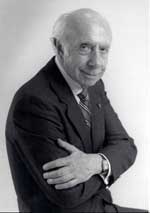Morton Gould

(1913-1996)
GOULD, MORTON (1913–1996), composer, conductor, pianist. Born in Richmond Hill, New York, Gould was a precocious pianist and composer. He entered the Institute of Musical Art in New York at the age of eight. Later, he studied at New York University. By the time he was 18, his 3 Conservative Sketches (1932) had been published by G. Schirmer. He worked as a pianist, arranger, composer, and conductor with various radio orchestras and at Radio City Music Hall in New York. He composed for television shows, including the educational World of Music series, the World War I and Holocaust broadcasts. Later he appeared as guest conductor with many of the major U.S. orchestras. In his compositions, Gould moved freely between the domains of light and serious music, often using American folk and popular idioms, and in many works adapting jazz resources to classical forms. In 1933 Stokowski and the Philadelphia Orchestra performed the premiere of his Chorale and Fugue in Jazz. Gould wrote for films (such as Delightfully Dangerous in 1945), stage, and ballet, and composed major works for concert bands (including two symphonies and orchestral works which he transcribed for band). His music is an important part of the American band repertory. In 1994 he received a Kennedy Center Honor for his contributions to American culture. His final orchestral work, Stringmusic, written for the farewell of Rostropovich from the National SO, won the Pulitzer Prize. Among his well-known pieces are: Three American Symphonettes, for orchestra (1933, 1935, 1937; the Pavane from the second symphonette became a popular light concert piece); Spirituals, for orchestra (1941, also frequently perfomed); Chorale and Fugue in Jazz, for two pianos and orchestra (1936); Latin American Symphonette, for orchestra (1941), Of Time and the River, for unaccompanied chorus (1946); Concerto for Tap Dancer and Orchestra (1952); Viola Concerto (1944).
Sources:Grove online; L. Evans: Morton Gould: his Life and Music, diss., Columbia U. Teachers College (1978).
[Israela Stein (2nd ed.)]
Encyclopaedia
Judaica. © 2008 The Gale Group.
All Rights Reserved.
|